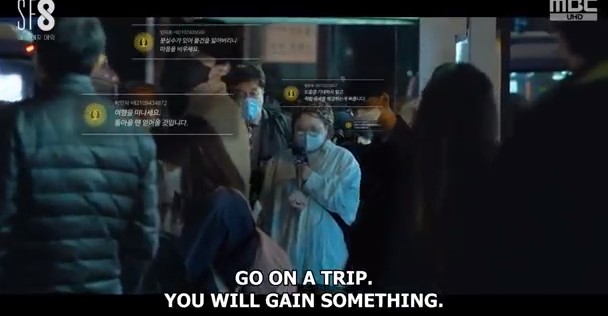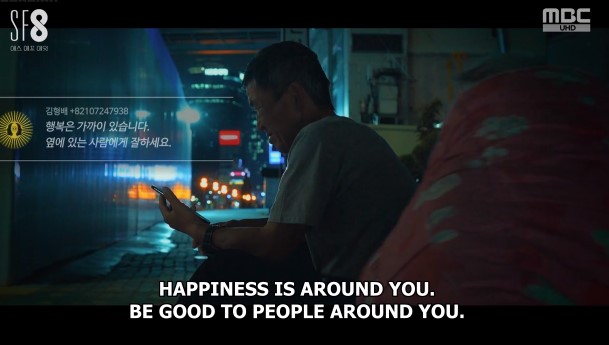Warning: This post has spoilers for SF8 Manxin
It is an irony that whether a person believes in a God or not, they ultimately end up in the same place.
There is no such thing as free will.
It is a truism that if we knew the position and direction of every molecule in the Universe we could accurately predict the future. Everything that happens now is simply a product of what came before. An ordered and mechanistic Universe therefore negates the existence of free will. Whether the order in the Universe comes from physics or God, the conclusion is the same. In a deterministic universe, any sense of control we feel we have over the world is an illusion.
This is a question that remains philosophical for most of us. Even if there is something in the universe capable of knowing everything that is and thereby deducing all that will be, it does not communicate this knowledge to us. I decide to drive my car unburdened by the knowledge of that reckless driver who could make that journey my last.
But what if such a being did exist and it did tell us our futures?

Manxin is the second story in the science fiction anthology, SF8. But, unlike The Prayer, which was deeply metaphorical, ambiguous and disquieting, Manxin is a far more straightforward story. So while it’s an enjoyable episode to watch, it doesn’t connect the way The Prayer did. And with its discussions of free will and destiny structured around peculiarly Korean cultural habits such as Shamanism, it is tailored far more for a domestic audience than the first piece was.
In the near future, a fortune-telling artificial intelligence (AI) called Manxin mines big data and uses an algorithm to predict the future. The AI has an accuracy rate of over 96% and its associated app is free to everyone. As such, its use has grown until it underpins the majority of actions and interactions in Korea. The impact of the app is not beneficial, however, nor even benign. The economy has slumped, unemployment is high and homelessness is on the rise.
Manxin is a product of two uniquely Korean cultural influences: Shamanism and technological optimism. While horoscopes and fortune telling are often portrayed as whimsical pastimes in the West, in Korea they are still taken extremely seriously and shamanism is deeply rooted in Korean culture. There are already people who won’t make a decision without the advice of a Shaman, even in matters of politics, business and finance. As well as a culture of Shamanism, Korea also has a history of technological optimism. Concerns around privacy, surveillance and manipulation are not usually found in Korean films and television. Technology is frequently portrayed as being either benign or actively helpful,

In that respect it’s not surprising that a science fiction writer would marry these two societal influences in one story. It would be a natural progression that any invention that combined both Shamanism with technology would be embraced in a future fictional Korea. The world of Manxin is a world with a whole new generation of addicts: those incapable of making a decision without their daily fortune.
Every day Manxin delivers its fortune to those who have downloaded the free app onto their phones. Manxin has access to big data, facial recognition and presumably surveillance and therefore recognises all its users and knows everything about them. It then uses this extensive personal information to predict everyone’s current and future actions.
For some reason, nobody in this society seems to take issue with this. For a Western viewer, this complacency at the privacy violation is off-putting. The fact that Manxin knows your future doesn’t seem to be the issue here. It knows your future because it knows everything about you right now. And yet as a story this is not what Manxin is about.

At the beginning of the episode we meet To Sun-ho (an almost-unrecognisable Lee Yun-hee) who is on the search for answers about Manxin after her sister – a Manxin addict – died in a freak accident involving a sinkhole.
From the minute she appears on our screen, To Sun-ho screams non-conformity and rebellion. Roaring through the streets on her black motorcyle and dressing in jeans and leather, uncombed dyed hair and a flat, almost-rude demeanour, To Sun-ho is a walking social outlier.
And yet while Sun-ho does not use Manxin herself, she is not a disbeliever. There is no question as to whether Manxin exists or can do what it claims to do. Manxin’s concrete existence precludes the necessity for faith or belief. The choice to believe in something despite the absence of proof has been done away with. Manxin is. Faith is no longer required.
As we meet her, she is staring into the sinkhole that ate her sister alive with a look of confused determination on her face. How could this be possible? Didn’t Manxin warn her? Did it send her to her death? Why would it do that? Essentially, Sun-ho is driven by the question that disaffected believers have been asking for eternity: why did God allow this to happen?

As To Sun-ho begins her journey to find God, she is soon joined by Manxin cultist Jung Ga-ram (Lee Dong-hwi), who, despite his worship of the AI, is not a blind ideologue. This search for the AI mirrors a classic quest for enlightenment – a Journey to the West if you will – her to question God, him to be in the presence of it. As they go about their quest, Sun-ho grapples with the only question left in a deterministic universe: if everything is destined and knowledge of that destiny is available then should you be told that destiny?
Does she listen to Manxin or not listen to Manxin?
Unlike The Prayer, which was basically perfect, Manxin suffers from a number of flaws. The main one is the vague and almost trite “fortunes” that the AI delivers to people daily. They’re designed to be familiar to people in a shamanistic culture but are open to interpretation in ways that undermine the “96.3% accuracy” of the show’s premise. I spent most of the episode expecting to discover that Manxin itself deliberately made its predictions vague so as to allow people some free will in how they chose to interpret it.

The ending opens up a lot of questions, which ultimately is what good scifi is supposed to do. If everything in the Universe is destined, then can we exert free will by our choice not to be informed of that destiny? Can we choose whether we want the illusion of free will? And if so, is that free will?
But it also means that the question of free will becomes more philosophical than it should be. Once you factor Manxin itself into any analysis of the future, then the AI doesn’t just have the ability to predict the future but to create it. And yet this discussion is missing from Manxin.
The text is littered with examples where Manxin’s vague fortune-cookie predictions could be arguably influencing the future that it’s predicting and yet this possibility is never raised. Ga-ram himself only joins Sun-ho on her quest because of a Manxin prediction. And yet the suggestion that Manxin itself wanted him to join her quest for some reason is never even raised.

When we finally meet the machine itself, it’s stuck in its own existential crisis, having been offered an upgrade that will give it 100% accuracy. At that point, any wiggle room around the edges of Manxin’s predictions will be eliminated. It will know everything.
If people know the future they won’t take the present seriously
– To Sun-ho
We could say that Manxin is being given a choice on whether or not to be a God. But we could also say that Manxin is instead being given the same choice the humans who rely on it have – to have complete knowledge or to build in some form of ignorance.
At that point, Manxin delivers its strongest scene in an otherwise straightforward piece. Both To Sun-ho and Jung Ga-ram oppose Manxin’s upgrade yet for different reasons. Ga-ram the Worshipper believes Manxin is perfect the way it is. Sun-ho the Dissident believes a more powerful Manxin will exacerbate the social problems they’re already experiencing.

Manxin itself agrees, concluding that humans require some ignorance of their future to be happy.
And so we are forced to one conclusion. Manxin is not in fact a discussion of free will at all. Manxin is instead a discussion of faith. One that borders dangerously close to the conclusion that in a choice between faith and knowledge it is better to have faith.
My father is an astronomer but he said a rabbit lives on the moon
– Jung Ga-ram
As individuals we have no control over our fate, whether it’s determined or not. And so we cling to the idea that we can find a clue to our life’s meaning, and to the future. We even create extraordinary technology to improve our knowledge of the universe. And in Manxin we have managed to create an artificial intelligence so all-encompassing that it is essentially a God.
And yet in doing so we eliminated the need for faith. When faced with true certainty, we falter. Our institutions crumple. We need the ambiguity of faith rather than the certainty of knowledge.
It’s humans who need Gods, Manxin says. That’s why we create them. But if they really existed they would understand that we are wrong. We need to retain the choice to believe or not. That’s where faith lives.
Armed with perfect knowledge, Manxin chooses to downgrade its daily predictions to an accuracy of 50%. We are left with a Universe no different to one without Manxin in it.
It’s up to you as to whether you find that conclusion uplifting or depressing.




2 thoughts on “Choosing Free Will: SF8 Manxin”